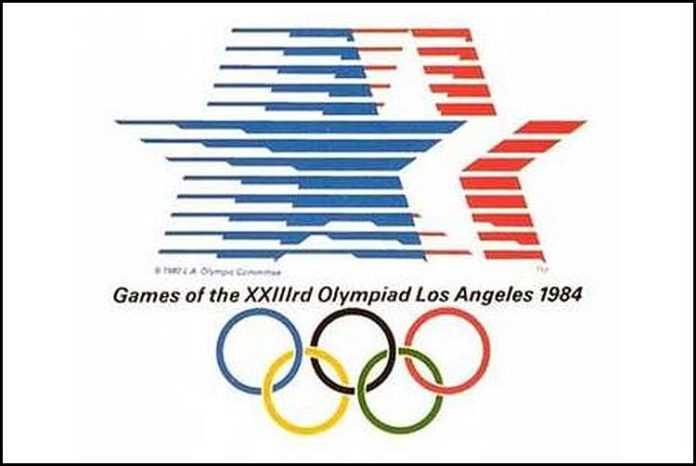(This is a reprint of our Lane One column of 9 May 2018, which was available in our old PDF format and not as widely accessible as our current format. Thirty-five years afterwards, the 8th of May, 1984, is still a day to be remembered as the start of the modern Olympic Movement.)
Everyone involved with the organization of the 1984 Olympic Games knew that 8 May 1984 was going to be a historic day.
No one knew just how historic.
It was raining in New York City, where an unprecedented edition of the Olympic Torch Relay was going to start with a short ceremony at United Nations Plaza.
The relay itself was controversial before it started. The Los Angeles Olympic Organizing Committee (LAOOC) decided to re-imagine the concept of the relay and use it to bring the Games to the entire United States and to raise money for charitable purposes, neither of which had ever been done before.
The plan finally settled on a stunning route of 15,000 km (~ 9,375 miles) across the U.S., through 33 states and the District of Columbia. Individuals could carry the torch for one kilometer through the Youth Legacy Kilometers program – for $3,000 – with the money going to the YMCA, the Boys and Girls Clubs of America and the Special Olympics.
No one had ever tried anything like this before and on top of the logistical nightmares were the howls of protest from the Hellenic Olympic Committee (HOC) in Greece. In a country where the national carrier is named Olympic Airways (!), the Greeks hysterically claimed that the LAOOC has “commercialized” the Olympic flame and would not participate in the lighting of the torch at Olympia unless sales of the Youth Legacy Kilometers was ended.
The LAOOC finally agreed and 3,436 kilometers were sold near the end of March, when the program was closed at the HOC’s request, providing $10,950,567.68 to the youth organizations. Even so, the HOC threatened not to provide the flame at a ceremony at Olympia and a cloak-and-dagger operation was initiated and obtained a flame from the International Olympic Committee headquarters in Lausanne (SUI) and flown to New York … just in case. At the last moment, the Greek government intervened and a scaled-down ceremony was held and the flame presented to the LAOOC at Olympia in time to start the relay on 8 May.
Problems solved, right?
The Torch Relay was opened with a short ceremony in New York, hosted by 1960 Olympic Decathlon Champion Rafer Johnson and the first torchbearers – the grandchildren of Jesse Owens (Gina Hemphill) and Jim Thorpe (Bill Thorpe, Jr.) started the route together.
Then, everything changed.
About two hours later, an announcement was made on an evening news program from Moscow that “the National Olympic Committee of the USSR is compelled to declare that participation of the Soviet sportsmen in the [1984] Games is impossible.” There were supposed “security concerns,” but in fact the decision was a reply to the U.S.-led boycott of the 1980 Games in Moscow. There was no doubt that the other Warsaw Pact countries would follow, but who else?
At the time, I was the Vice President/Press Operations for the LAOOC and like the rest of the roughly 1,750 staff members, working feverishly to make the Games happen. The boycott announcement was hardly a surprise, although the LAOOC had all but turned itself into a pretzel trying to assure the Soviet sports officials that there were no actual grounds for a boycott, but the timing was.
There was a plan to move forward, however.
LAOOC General Manager Harry Usher – one of the true heroes of the Games – called a staff meeting in the afternoon at the LAOOC headquarters and explained what was known at the time and that anyone who had contacts at any level with officers or staff at National Olympic Committees, national sports federations or International Federations in foreign countries needed to make themselves known and be ready to act.
The LAOOC had a lot of people who fit that description. In a break from what many had expected, the LAOOC – at the urging of both Usher and LAOOC chief Peter Ueberroth – had been hiring people from all over the world to help with the organizing effort. We had a brilliant Turkish statistician, Nejat Kok, working in Press Operations who was well connected with his National Olympic Committee. Other departments had folks from many other countries as well.
All of them were immediately recruited to use their contacts to urge their NOCs to formally reply that they would attend the Games. Bilingual staff members made phone calls directly to NOC president and general secretaries to urge acceptance to the invitation in their own languages.
The LAOOC’s government relations team in Washington, D.C. – yes, we had an office there, under the excellent direction of Jay Moorhead – visited more than 50 embassies to promote formal, positive responses to the invitation to compete in Los Angeles.
Los Angeles Mayor Tom Bradley, the first African-American mayor of the city, who had strong contacts with African nations, made calls and sent personal messages by telex asking for confirmations of attendance to African NOCs and governments.
The IOC President, Juan Antonio Samaranch, himself a former Spanish ambassador to Moscow, was busy too. He convened a face-to-face between the LAOOC and the Soviet NOC in Lausanne on 18 May, where the same excuses were given. No progress, but the impact on others was positive.
Then Samaranch jetted off and attended the annual meeting of Socialist Sport Ministers in Prague (CZE) on 24 May. It was at that meeting that Romania announced its intention to attend the Games, despite being a Warsaw Pact member. This was excellent, but getting the Soviets to reverse course looked hopeless.
If this sounds like a lot of scurrying around, it was. And at the LAOOC, it came in addition to the continuing workload of organizing the Games, ordering equipment, recruiting and training volunteers and trying to keep everyone focused on the tasks at hand.
It worked, and almost too well!
By the 2 June deadline for acceptance, a stunning total of 142 countries signaled that they would attend the Games. This included Romania, and the People’s Republic of China; this was the first time that Communist China would participate in the Games. This shattered the prior record of 122 countries from Munich in 1972, but there was more to do.
Ueberroth went to Cuba to try and convince Fidel Castro to at least send a baseball team – a demonstration sport in 1984 – and if not, to refrain from promoting the boycott elsewhere. Castro said he had to stand with the Soviets on participation, but would otherwise keep quiet. That was a considerable plus, and Ueberroth also left with a considerable load of gifts, including Habana Club rum and Cohiba cigars!
In the meantime, there was another meeting in Lausanne from 28-30 May, to take the entry places assigned to the boycotting countries – including the powerhouse USSR, East German and Cuban teams – and re-allocate them to other countries. Many NOCs were only too happy to get more chances to compete in Los Angeles and actually asked for more places during their messages confirming their attendance at the Games!
Even in Press Operations, we were asked for more media credentials for some nations as the allocations from the boycotting countries would – for the most part – not be used. We were happy to make the substitutions.
We lost Angola later and Libya on the eve of the Games, so 140 NOCs competed in Los Angeles, still a record by a long way. There was some worry about our agreement with ABC, which called for a rebate on some of its $225 million rights fee if a boycott caused a reduction in their planned-for ratings. Instead, their ratings went up and set new records (no, the LAOOC didn’t get a bonus).
The outcome was both gratifying and energizing for those of us on the LAOOC staff. We were going to do everything in our power to make the Games so good that it would shame the Soviets into attending every Games in the future.
And we did. As it turned out, the great success of the Olympic Movement over the next 30 years, after financial ruin and boycotts, started upward on the 8th of May in 1984. A bad day? No, a good one.
Rich Perelman
Editor



























